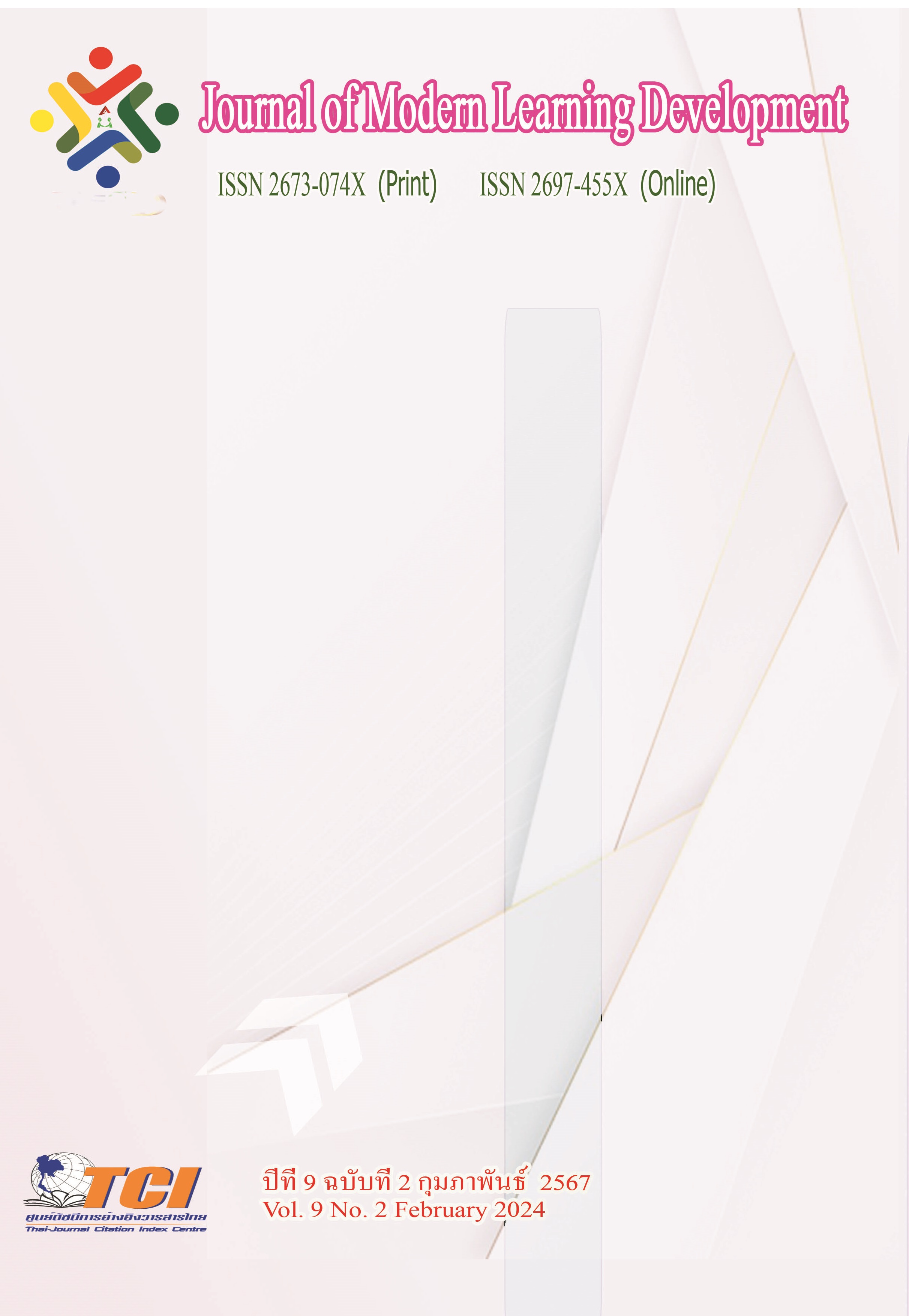The Influence of Intrinsic Motivation Affects the Intention to Increase Entrepreneurial Ability of Maejo-Chumphon University Students
Main Article Content
Abstract
Nowadays, self-employed businesses are a prevalent occupation. However, many new entrepreneurs are unsuccessful in their businesses due to a lack of knowledge and ability to be an entrepreneur. Hence, learning to increase entrepreneurial ability is necessary. Providing intention and determination in learning will result in students succeeding in increasing their entrepreneurial abilities. Therefore, this research aimed 1) to study intrinsic motivation, such as entrepreneurial attitude and perceived readiness to be an entrepreneur, affecting the intention to increase the entrepreneurial ability of Maejo-Chumphon University students, and 2) to study subjective norms, affecting the intention to increase the entrepreneurial ability of Maejo-Chumphon University students. This research was quantitative. A sample group in this research was 160 students studying at Maejo-Chumphon University. Purposive sampling, which is non-probability sampling, was used to select samples. A closed-ended multiple choice questionnaire with a 5-point Likert-Scale was used as a tool of this research to collect data from November 1- December 31, 2566. Descriptive statistics were employed to describe the general characteristics of the respondents. Pearson correlation analysis was used to test the relationship between independent variables. Multiple regression analysis was applied to test the hypotheses of this research.
The outcomes were as follows: 1) Entrepreneurial attitude and perceived readiness to be an entrepreneur significantly affect the intention to increase the entrepreneurial ability of students of Maejo-Chumphon University. 2) Subjective norms also significantly influence the intention to increase entrepreneurial ability. Additionally, perceived readiness to be an entrepreneur is most influential, followed by entrepreneurial attitude and subjective norms. 3) The interaction effect between females and subjective norms strongly and significantly influences the intention to increase entrepreneurial ability compared with males.
Article Details
References
สำนักบริหารและพัฒนาวิชาการ มหาวิทยาลัยแม่โจ้ (2566). สถิติจำนวนนักศึกษาตามปี ภาค (แยกคณะ) ภาคการศึกษาที่ 2 ปี 2566. ออนไลน์. สืบค้นเมื่อ 17 ธันวาคม 2566. แหล่งที่มา: http://www. education.mju.ac.th/statistic/student/studentByAcadSemFacSum.aspx
สุรวิทย์ อัสสพันธุ์ (2556). ผลของโครงสร้างเป้าหมาย ความเชื่อเกี่ยวกับความฉลาด และความมั่นใจในความ ฉลาดของตนเองที่มีต่อเป้าหมายเชิงสัมฤทธิ์และความมุ่งมั่นในการเรียนรู้เชิงพฤติกรรมของนิสิต นักศึกษาในระดับปริญญาตรีสาขาครุศาสตร์ศึกษาศาสตร์. ปริญญานิพนธ์วิทยาศาสตรดุษฎีบัณฑิต สาขาวิชาการวิจัยพฤติกรรมศาสตร์ประยุกต์. บัณฑิตวิทยาลัย: มหาวิทยาลัยศรีนครินทรวิโรฒ.
Jirawat Wongchun (2023). เพิ่มพลังความสำเร็จด้วย 5 ทักษะการเป็นผู้ประกอบการที่ดี. taxcount. ออนไลน์. สืบค้นเมื่อ 19 มกราคม 2567. แหล่งที่มา: https://www.taxcount.co/5-skills-of-being-a-good-entrepreneur/
Ajzen, I. (1991). The theory of planned behavior. Organizational behavior and human decision processes, 50 (2), 179-211.
Al-Mamary, Y. H., Siddiqui, M. A., Abdalraheem, S. G., Jazim, F., Abdulrab, M., Rashed, R. Q., Alquhaif, A. S., & Aliyu Alhaji, A. (2023). Factors impacting Saudi students' intention to adopt learning management systems using the TPB and Utaut Integrated Model. Journal of Science and Technology Policy Management, 1-32.
Echecopar, G., Bustamante, C., & Bejares, C. (2011) Entrepreneurial Intentions - Guesss Survey. Online. Retrieved January 19, 2024. From: https://www.guesssurvey.org/ resources/nat_2011/Chile_GUESSS_Report_2011.pdf
Fouad Altameemi, A., & Abdel Fatah Al-Slehat, Z. (2021). Exploring the students' behavior intentions to adopt E-Learning Technology: A survey study based on covid-19 crisis. International Journal of Business and Management, 16 (6), 31-41.
Kabir, S., Haque, A., & Sarwar (2017). Factors Affecting the Intention to Become an Entrepreneur: A Study from Bangladeshi Business Graduates' Perspective. International Journal of Engineering and Information Systems, 6 (1), 10-19.
Polas, M. R., Raju, V., Muhibbullah, M., & Tabash, M. I. (2021). Rural women characteristics and sustainable entrepreneurial intention: A road to economic growth in Bangladesh. Journal of Enterprising Communities: People and Places in the Global Economy, 16 (3), 421–449.
Raza, S. A., Qazi, W., & Shah, N. (2018). Factors affecting the motivation and intention to become an entrepreneur among business university students. International Journal of Knowledge and Learning, 12 (3), 221-241.
Ryan, R. M., & Deci, E. La. (2000). Intrinsic and extrinsic motivations: Classic definitions and new directions. Contemporary Educational Psychology, 25 (1), 54-67.
Ryan, R. M., & Deci, E. Lb. (2000). Self-determination theory and the facilitation of intrinsic motivation, social development, and well-being. American Psychologist, 55 (1), 68–78.
Schreuder, E., van Erp, J., Toet, A., & Kallen, V. L. (2016). Emotional responses to multisensory environmental stimuli. SAGE Open, 6 (1), 215824401663059.
Sharma, R. (2023). Top 10 entrepreneurship skills every entrepreneur should have. Emeritus Online Courses. Online. Retrieved January 19, 2024. From: https://emeritus.org/blog/ entrepreneurship-to-entrepreneurship-skills/
Stahl, A. (2023). 5 emerging entrepreneurship trends. Forbes. Online. Retrieved January 19, 2024. From: https://www.forbes.com/sites/ashleystahl/2023/04/07/5-emerging-entre preneurship-trends/?sh=69424db32260
Venketsamy, A., & Lew, C. (2022). Intrinsic and extrinsic reward synergies for innovative work behavior among South African Knowledge Workers. Personnel Review, 53 (1), 1–17.
Wang, Y.-Y., Lin, T.-C., & Tsay, C. H.-H. (2016). Encouraging is developers to learn business skills: An examination of the Mars model. Information Technology & People, 29 (2), 381–418.
Willingham, A. (2023). What is Maslow's hierarchy of needs? A psychology theory, explained. CNN. Online. Retrieved January 19, 2024. From: https://edition.cnn.com/world/ maslows-hierarchy-of-needs-explained-wellness-cec/index.html
Yoopetch, C. (2020). Women empowerment, attitude toward risk-taking and entrepreneurial intention in the hospitality industry. International Journal of Culture, Tourism and Hospitality Research, 15 (1), 59–76.


